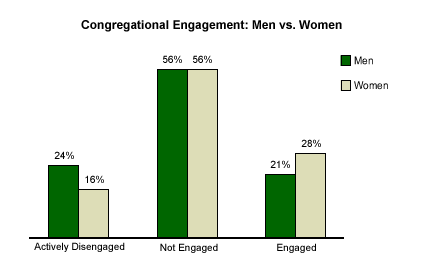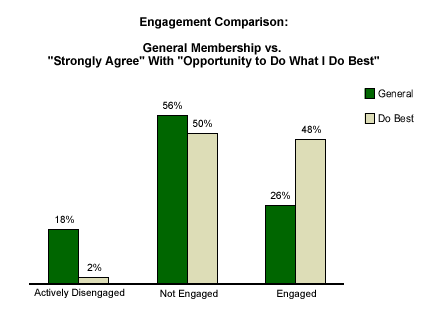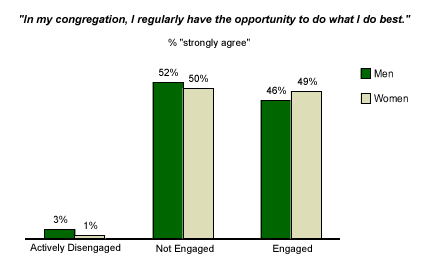Over the last 2 weeks, we've examined the gaps between men and women in several areas of religious and spiritual life -- including engagement in congregations. For the most part, the differences favor female congregation members -- but consider the results for one religious question from a January 2002 Gallup Poll*: 38% of men described themselves as "spiritual but not religious," while only 28% of women described themselves that way. This finding suggests that traditional religious institutions may be somewhat less equipped to fulfill the spiritual needs of men. Gallup research on spiritual engagement may provide a key that could help congregations be more successful at engaging men.
Doing What I Do Best
According to Gallup's Congregational Engagement Index**, 26% of congregation members nationwide are "engaged," 56% are "not engaged," and 18% are "actively disengaged." (See "Breakthrough Research on Congregational Engagement" in Related Items.) When broken down by gender, men tend to be less engaged with their congregation (21% vs. 28%) and more actively disengaged (24% vs. 16%) than women.

However, among members of faith communities who strongly agree that they regularly have the opportunity to do what they do best in their congregations, engagement nearly doubles and active disengagement virtually disappears.

Offering members the opportunity to discover their strengths and talents, then helping them use those strengths and talents within their congregations is an essential part of engagement (see "In My Congregation, I Regularly Have the Opportunity to Do What I Do Best" in Related Items). Further, the numbers suggest that this item may be the key to engaging men in their congregations.
Engagement levels among men and women who strongly agree that they regularly have the opportunity to do what they do best in their congregations are nearly the same -- 46% for men and 49% for women. What's more, the active disengagement levels for men and women in this group drop significantly -- from 24% to 3% for men and from 16% to 1% for women.

Key Points
When members are given equal opportunities to do what they do best in their congregations, gender-based differences in engagement levels evaporate. But Gallup data suggest that faith communities have not offered these opportunities to men as successfully as they have to women. The solution requires a change in perspective: instead of creating roles and then finding people to fit those roles, congregation leaders should start with the person and then define the role. Men and women need not be treated differently; each individual -- man or woman -- needs to be treated uniquely and given opportunities to serve that fit his or her specific talents.
The bottom line is that in order to develop a congregation that engages men at the same level as women, leaders need to discover each individual's talents and strengths first, and then find or create an opportunity for service that builds upon them.
*Results are based on telephone interviews with 1,008 national adults, aged 18 and older, conducted Jan. 11-14, 2002. For results based on the total sample of national adults, one can say with 95% confidence that the margin of sampling error is ±3%.
**Results are based on telephone interviews with 729 adult members of a church, synagogue, or other religious faith community, aged 18 and older, conducted October through November 2001. For results based on this sample, one can say with 95% confidence that the margin of sampling error is ±3.6%.
